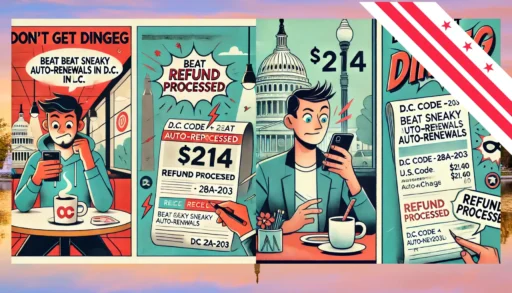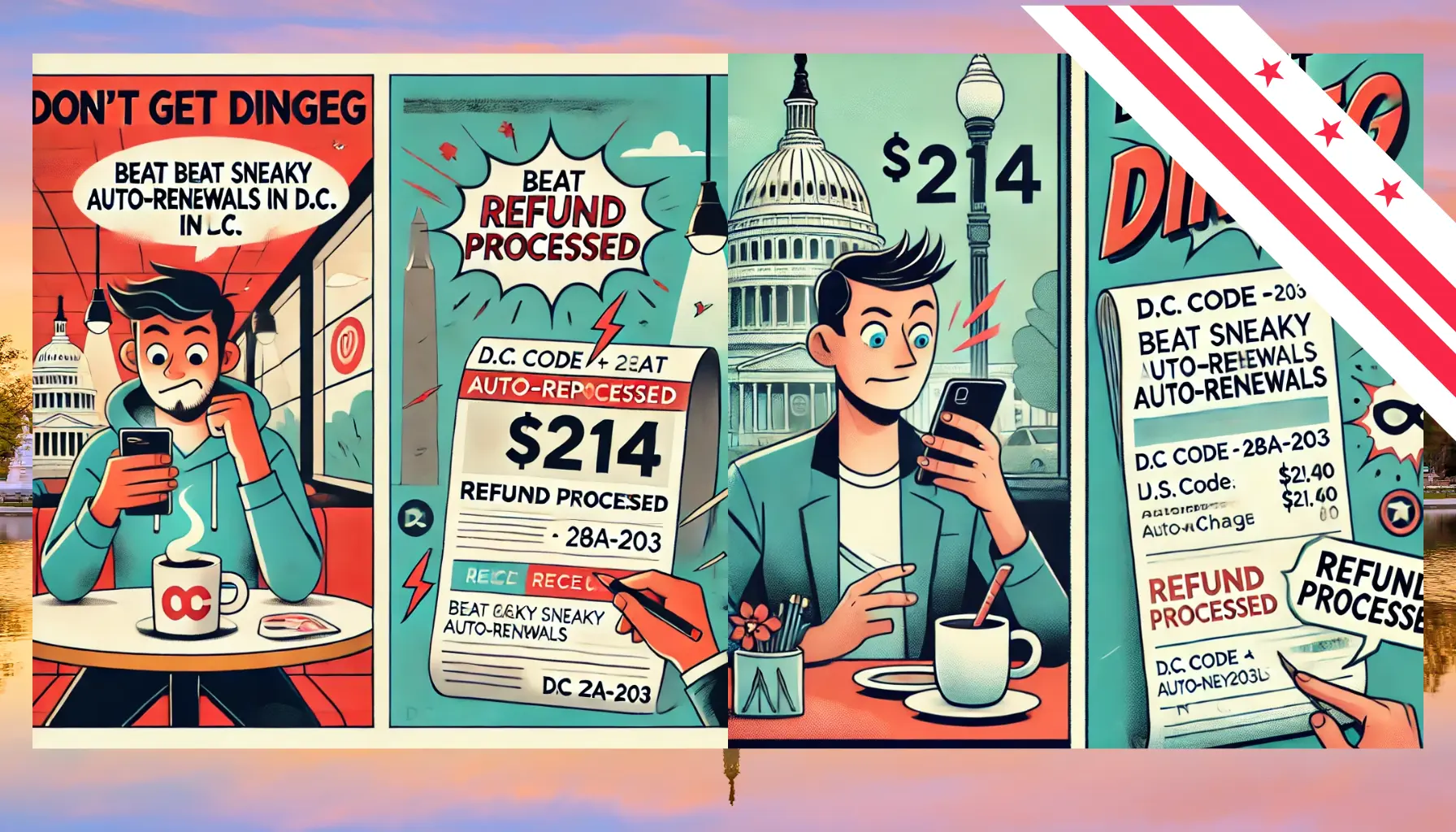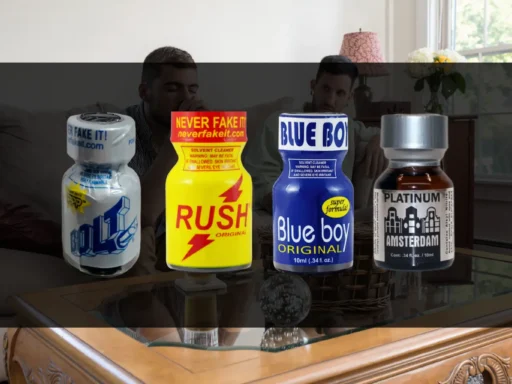I’m not a lawyer. Picture this: you’re sipping your overpriced D.C. coffee, scrolling through your bank app, when—bam!—a $214 charge from some subscription you barely remember hits you like a Metro delay. That’s exactly what happened to me last month. I signed up for a “free trial” back in November, forgot about it, and suddenly I’m out enough cash to fund a weekend brunch. When I called the company, they were all “no refunds, sorry not sorry.” But then I dropped a little legal knowledge—DC Code § 28A-203—and poof, they found their manners and refunded me. Turns out, D.C. has your back when it comes to sneaky auto-renewals, and I’m here to spill the tea on how you can protect your wallet.
The Law: DC Code § 28A-203, Your Wallet’s New BFF
Let’s break down DC Code § 28A-203 in plain English, because legalese is nobody’s love language. This law, passed in 2019, is like a consumer protection superhero, ensuring businesses can’t just auto-renew your subscriptions without playing by the rules. Here’s what it demands:
- Clear Contracts: If a subscription auto-renews, the company must spell it out in the contract—big, bold, and impossible to miss. They also have to tell you how to cancel.
- Free Trial Transparency: Signing up for a “free” trial? They must explain what you’ll pay when it ends or if the price changes.
- Long-Term Subscription Notices: For contracts lasting 12 months or more that renew monthly (or longer), businesses must send you a heads-up 30–60 days before the first renewal and every year after. This notice can come via first-class mail, email, or text/app if you’ve okayed it. It must include:
- A warning that the subscription will renew unless you cancel.
- The renewal cost.
- The cancellation deadline.
- Contact info for more details (like a phone number or email).
- Free Trial Consent: If your free trial lasts a month or more and auto-renews, they need to notify you 15–30 days before it ends and get your explicit consent before charging you.
If a company skips any of these steps, the auto-renewal is null and void, the contract ends when the term does, and they’ve violated D.C.’s Consumer Protection Procedures Act. That’s a big deal, it means they could face penalties, and you might get your money back. In my case, the company didn’t send me a single email or text before charging me $214. Once I pointed out the law, they knew they were caught.
How Does D.C. Stack Up?
D.C.’s law is no lightweight—it’s got muscle, similar to California’s, which is the gold standard for consumer protection. According to a state law comparison, California requires clear disclosures, easy cancellation, and even lets consumers sue for violations. D.C.’s law is just as broad, covering all goods and services, unlike some states where it’s limited to specific industries. For example:
- New York and Utah: Only cover service contracts for repairs or maintenance.
- Maryland and New Hampshire: Just health clubs.
- South Dakota: Only telecommunications.
D.C.’s law, like California’s, applies to everything from streaming services to gym memberships, making it a powerful tool for residents. Plus, it aligns with federal guidelines from the FTC’s Negative Option Rule, which recently introduced “Click-to-Cancel” rules in 2024 to make canceling subscriptions as easy as signing up. So, D.C. dwellers, you’re in a good spot to fight back against shady practices.
Spotting, Avoiding, and Slaying Shady Renewals
Spot the Sneak
Businesses love to bury auto-renewal clauses in fine print that’s harder to read than a D.C. parking sign. Here’s how to catch them:
- Read the Terms: Before clicking “I Agree,” scan for words like “auto-renew” or “continuous subscription.” The law says they have to make it obvious, so if it’s hidden, that’s a red flag.
- Check Free Trials: Make sure the company explains what happens post-trial. Will you be charged $9.99 or $99.99? Know before you sign.
- Look for Notices: Legit companies will send emails or texts before renewing. If your inbox is silent, they might be breaking the law.
Avoid the Trap
Don’t let auto-renewals turn your bank account into a piñata. Try these tips:
- Set Reminders: Pop a calendar alert for when your free trial ends. Apps like Rocket Money can also track subscriptions.
- Monitor Statements: Check your bank or credit card statements monthly. A $214 surprise is easier to fight if you catch it early.
- Use Virtual Cards: Some credit cards, like Capital One, offer virtual card numbers for online purchases. Use one for subscriptions, and you can delete it if things get sketchy.
- Be Selective: Only sign up for trials you really need. That “free” meditation app might not be worth the hassle.
Fight Back Like a Pro
If you get hit with an unauthorized charge, channel your inner Elle Woods and take action:
- Contact the Company: Call or email, politely but firmly request a refund, and name-drop DC Code § 28A-203. In my case, this was enough to get results.
- Document Everything: Save emails, screenshots, and contract terms. Evidence is your best friend.
- Escalate if Needed: If the company stonewalls, file a complaint with the D.C. Office of the Attorney General’s Consumer Protection Office. They can mediate or investigate, and it’s free for D.C. residents.
- Know the Law’s Power: Violations of § 28A-203 also breach the Consumer Protection Procedures Act, which could mean bigger consequences for the company.
Call to Action: Own Your Rights
D.C. folks, you don’t have to let companies pull a fast one. If you’ve been charged without proper notice, stand your ground. Here’s a template email to send to the company:
Dear [Company Name],
Thanks for taking the time to read my email.
I was recently charged $[amount] for an automatic subscription renewal on [date]. However, I did not receive the required advance notice as mandated by DC Code § 28A-203. This law requires clear and conspicuous notice before auto-renewing a subscription, including specific notifications for free trials or long-term contracts.
Since you failed to comply, this charge violates D.C. law, and I am entitled to a full refund. Please process the refund immediately and confirm via email. If I do not hear back within [5 business days], I will escalate this to the D.C. Office of the Attorney General.
Contact me at [your email/phone] with any questions.
Sincerely,
[Your Name]Send it, and don’t be afraid to follow through. The D.C. Attorney General’s Consumer Complaint portal is user-friendly, and their team is there to back you up. While I couldn’t find specific lawsuits tied to this law, the Attorney General’s Office actively enforces consumer protections, so your complaint could spark action.
Notable Cases? Not So Much (Yet)
I dug deep for high-profile cases or enforcement actions under § 28A-203, but the trail’s pretty quiet. The law’s only been around since 2019, and it seems enforcement might happen through mediation or settlements rather than splashy lawsuits. The D.C. Attorney General’s Office handles consumer complaints, but they don’t always publicize every case. That said, the law’s tie to the Consumer Protection Procedures Act means violations could lead to serious penalties, so companies have incentive to play nice when you call them out.
A Federal Backup
On top of D.C.’s law, the FTC’s Negative Option Rule offers federal protection. Updated in 2024 with the “Click-to-Cancel” rule, it ensures canceling a subscription is as easy as signing up. The FTC reports getting nearly 70 complaints a day about subscription practices in 2024, so this is a hot issue nationwide. D.C.’s law goes further with its specific notice requirements, but the federal rules give you extra ammo if you’re dealing with a national company.
Disclaimer: Not a Lawyer, Just a Savvy Blogger
Full disclosure: I’m not a lawyer, and this isn’t legal advice. Think of this as your sassy guide to understanding your rights. If you’re in a sticky situation, consult an attorney for tailored advice. My goal is to arm you with knowledge so you can strut into any consumer dispute like Erin Brockovich with a Wi-Fi connection.
Wrap-Up: Stay Sharp, D.C.
In a city where we’re all juggling Metro cards, rent, and overpriced cocktails, the last thing you need is a surprise subscription charge. DC Code § 28A-203 is your secret weapon to keep businesses honest. Know the law, check your statements, and don’t be afraid to throw some legal shade when needed. You’ve got this, D.C., now go save that $214 for something actually worth it, like a rooftop happy hour.
Key Citations
- DC Code § 28A-203: Automatic Renewal Provisions
- Lemberg Law: Comparison of Auto-Renewal Laws
- FTC: Negative Option Rule Overview
- D.C. Attorney General: Consumer Protection
Disclaimer: I’m not a lawyer, and this isn’t legal advice. Think of this as your sassy guide to understanding your rights. If you’re in a sticky situation, consult an attorney for tailored advice. My goal is to arm you with knowledge so you can strut into any consumer dispute like Erin Brockovich with a Wi-Fi connection.








